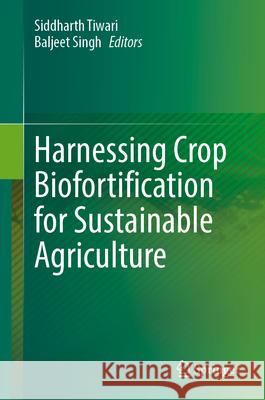Harnessing Crop Biofortification for Sustainable Agriculture » książka
Harnessing Crop Biofortification for Sustainable Agriculture
ISBN-13: 9789819734375 / Angielski / Twarda / 2024
This edited volume provides insights into the current state of food and nutritional security, highlights the significance of micronutrients for human health, offers a historical perspective on biofortification, and covers current strategies and challenges. This book explores the role of multidisciplinary approaches to cope up with the challenges of major nutrient deficiency.Hidden hunger (aka micronutrient deficiencies), a prevalent global issue, refers to the chronic deficiency of essential micronutrients despite sufficient caloric intake. With over 2 billion affected individuals, particularly women and children in low-income countries, it impairs physical and cognitive development, increases disease susceptibility, and diminishes productivity. Despite economic progress, undernourishment remains prevalent in the developing countries including India. Among all nutrients, the deficiencies of iron, zinc, iodine, and vitamin A are highly prevalent. Crop biofortification seems a sustainable solution to reduce the global burden of hidden hunger. Previous reports examined the genetic diversity related to micronutrients in germplasm of staple crops and their wild relatives. A number of biofortified crops have been developed by utilizing genetic diversity and biotechnological approaches. This book explores crop-specific biofortification initiatives and diverse approaches, encompassing both traditional and genomics-driven enhancements. It also enlightens the efficacy of biofortification, bioavailability, and future thrust. This book serves as a valuable resource for researchers, academics, extension workers, policymakers, students, and all those involved in agriculture, nutrition, and health. It focuses on promoting diets that are rich in nutrition, benefiting everyone along the value chain.











